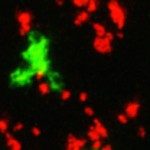Lien vers Pubmed [PMID] – 10540322
Eur. J. Immunol. 1999 10;29(10):3112-21
H-2 class I-negative, HLA-A2.1-transgenic HHD mice were used for a comparative evaluation of the immunogenicity of HLA-A2.1-restricted human tumor-associated cytotoxic T lymphocyte (CTL) epitopes. A hierarchy was established among these peptides injected into mice in incomplete Freund’s adjuvant which correlates globally with their capacity to bind and stabilize HLA-A2.1 molecules. Co-injection of a helper peptide enhanced most CTL responses. In contrast, classical HLA class I-transgenic mice which still express their own class I molecules did not, in most cases, develop HLA-A2.1-restricted CTL responses under the same experimental conditions. Different monoepitope immunization strategies of acceptable clinical usage were compared in HHD mice. Recombinant Ty-virus-like particles, or DNA encoding epitopes fused to the hepatitis B virus middle envelope protein gave the best results. Using this latter approach and a melanoma-based polyepitope construct, CTL responses against five distinct epitopes could be elicited simultaneously in a single animal. Thus, HHD mice provide a versatile animal model for preclinical evaluation of peptide-based cancer immunotherapy.

